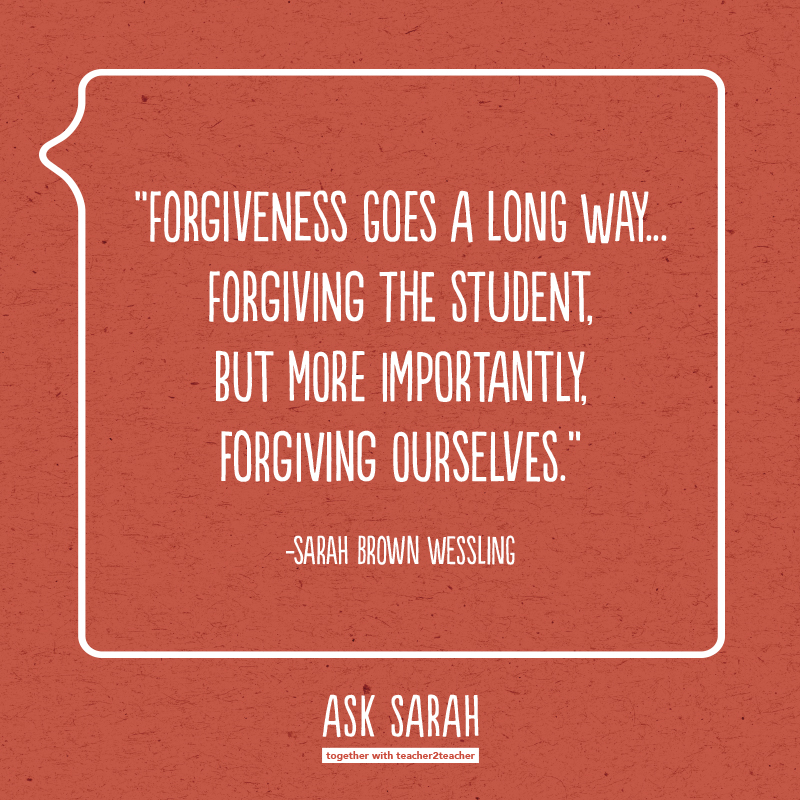
I just gave my first detention in five years of teaching. Right now, I’m angry and I’m really, really sad. So, I guess my question is if it ever gets easier? Does it ever get to a point where you don’t take those things personally? Where they don’t nearly wreck your entire day? Or am I going to be looking forward to this for 20 more years?
Sincerely,
First Detention Ever

Oh…I have so been in this very moment. Time and time again, in fact. It happens any time I have to cross that line into attaching consequences to poor choices. And if this is the first time in five years of teaching you’re navigating this threshold, then the beauty of it is there’s something important here to learn.
First, you are not alone. It’s human to be angry and hurt when anyone — student or not — is mean, disrespectful or inappropriate. I remember the day in my second year of teaching when a student didn’t like the grade he got on a paper and literally threw it in my face, yelled some choice expletives resembling, “Forget you!” and stomped out of the room. Detention: yes. Principal referral: yes. Second year teacher self: horrified and furious.
But like you’ve already noted, the anger gives way to something far less fleeting and far more searing: the sadness. If anger is the human moment then sadness is our teacher moment because we start to question. Everything. Was the lesson all wrong today? Did I miss some signal or sign that could have helped me prevent this? What if she doesn’t like this class? Despite all of the time and effort and commitment and patience, what if he really doesn’t like me? And is there nothing I can do about it? In some ways, I think it’s impossible to avoid these questions. But it is possible to learn from them because it’s not the moment of defiance or incredulity that characterizes us, it’s the way we learn from it that defines our teacher selves.
So it must come down to resolve. And here’s the question I use to find my intentionality: “What is the lesson this student needs to learn today? How would I want my own child to learn this lesson?” Sometimes this means a gentle reminder, other times it requires a steep consequence, that usually hurts us more than it hurts them.
We take these instances personally, because we are personally invested. But choosing to take it personally can be a toxic choice because you’re with that student tomorrow and the next day and the day after that. What he or she needs is your honesty, your empathy, and just a little amnesia on your part in an effort to offer a new, clean slate. Try a conversation. Write a note. Open a door. Ask to listen. These are also lessons we must teach and, often, they will give us entrance into their learning journeys.
Forgiveness goes a long way in these moments. Forgiving the student; but more importantly, forgiving ourselves.
Teach openly,
Together with Teacher2Teacher




top rated canadian online pharmacy
certified canadian pharmacy
best canadian prescription prices
mexican mail order pharmacy
Our dating platform is the best way to find interesting people who are looking for companionship.
Our online platform lets you connect with interesting individuals anytime, anywhere.
Sign up for our dating network today and embark on your adventure to meeting the right person with Adult Flirt Finder.
Flirt Finder Dating Site is your key to success in online dating. Find potential matches and discover true love.
canada pharmacy online no script
Прогон сайта с использованием программы “Хрумер” – это способ автоматизированного продвижения ресурса в поисковых системах. Этот софт позволяет оптимизировать сайт с точки зрения SEO, повышая его видимость и рейтинг в выдаче поисковых систем.
Хрумер способен выполнять множество задач, таких как автоматическое размещение комментариев, создание форумных постов, а также генерацию большого количества обратных ссылок. Эти методы могут привести к быстрому увеличению посещаемости сайта, однако их надо использовать осторожно, так как неправильное применение может привести к санкциям со стороны поисковых систем.
Прогон сайта “Хрумером” требует навыков и знаний в области SEO. Важно помнить, что качество контента и органичность ссылок играют важную роль в ранжировании. Применение Хрумера должно быть частью комплексной стратегии продвижения, а не единственным методом.
Важно также следить за изменениями в алгоритмах поисковых систем, чтобы адаптировать свою стратегию к новым требованиям. В итоге, прогон сайта “Хрумером” может быть полезным инструментом для SEO, но его использование должно быть осмотрительным и в соответствии с лучшими практиками.
Добро пожаловать в texttospeech.ru, вашего надежного партнера в мире спортивный тотализатор. Мы с гордостью предоставляем вам шанс взять на себя контроль над вашими ставками и повысить свои шансы на успех. Наши опытные эксперты и специалисты следят за событиями в мире спорта, чтобы поддержать вас свежими и надежными советами.
Почему выбирать нас:
Качественные аналитические прогнозы: Наши аналитики усердно трудятся, чтобы предоставлять вам прогнозы на все популярные виды спорта. Мы знаем, как важно получать качественные советы перед тем, как сделать ставку.
Множество вариантов: Мы предлагаем ставки на разнообразные виды спорта, включая футбол, баскетбол, ракетку, бейсбол и многое другое. Вы можете выбирать из множества событий и наслаждаться страсть на свой вкус.
Бесплатные прогнозы: Мы поддерживаем идею, что каждый может получить доступ к качественным прогнозам. Поэтому мы предлагаем бесплатные предсказания, чтобы помочь вам сделать правильные ставки.
Простота и удобство: Наш сайт и мобильное приложение разработаны с учетом вашего удовольствия. Сделайте ставку буквально за несколько мгновений.
Как начать:
Создайте аккаунт: Создайте свой аккаунт в нашем ресурсе и получите доступ к всем нашим сервисам.
Получайте предсказания: Подписывайтесь на наши бесплатные прогнозы и получайте актуальные предсказания от наших экспертов.
Сделайте ставку: После того как вы получили полезный совет, сделайте ставку на команду по душе или событие и получайте удовольствие от игры.
Вознаграждение за успех: Вместе с texttospeech.ru, вы имеете возможность к вашей победе. Попробуйте наши услуги уже сегодня и переживайте в мир ставок на спорт во всей его красе!
Устройство пола – важный этап при ремонте. Укладка пола позволяет добиться ровное основание для финишной облицовки.
Мастера выполняют стяжка пола с учетом всех требований и нормативов. Укладка пола делается с использованием современных компонентов, которые предоставляют устойчивость и качество.
Покрытие пола позволяет подготовить идеальное основание для разнообразных видов облицовки. В столице стяжку пола проводят профессионалы.
Механизированная штукатурка — инновационный способ выполнения отделки стен.
Суть его заключается в использовании устройств для штукатурки, как правило, сделанных в Германии, что обеспечивает штукатурку подготавливается и покрывается на стену автоматически и с давлением.
Механизированная штукатурка стен С подтвержденной гарантией До 32 процентов выгоднее обычной, Можно клеить обои без шпаклевки от кампании mehanizirovannaya-shtukaturka-moscow.ru
Следовательно, улучшается прочность сцепления с поверхностью, а сроки выполнения работ снижается в 5–6 раз, в по сравнению с ручной отделкой. За счет автоматизации и упрощения рабочего процесса цена штукатурки стен за квадратный метр выходит дешевле, чем при традиционном методе.
Для машинной штукатурки применяются смеси, разработанные для механизированной штукатурки, стоимость которых меньше, чем для ручного нанесения примерно на треть. При соответствующих навыках и опыте специалистов, а также при соблюдении всех технологических правил, оштукатуренная поверхность оказывается идеально ровной (профессиональные стандарты) и гладкой, в связи с этим последующая обработка шпатлевкой не требуется, что предоставляет дополнительную экономию средств заказчика.
Пять лет мы искали свой звук – уникальный и запоминающийся, пять лет мы экспериментировали и меняли саунд-продюсеров. Мы находили и теряли, ругались и мирились, – всё ради нашей музыки и права на сцену… Тернист путь к себе, но сейчас мы понимаем что наша музыка – это музыка весны!
каспий музыка
Полусухая стяжка – строительная операция подготовки полок. Устройство полусухой стяжки способствует подготовить ровное основание для финишной отделки.
вес полусухой стяжки Мы сделаем супер ровную стяжку пола. 7 лет опыта работы От 500 рублей за квадратный метр
Обслуживание полутвёрдой стяжки осуществляет постоянный контроль и устранение недостатков с использованием технических средств.
Специализированные инструменты для полусухой стяжки даёт возможность провести монтаж с превосходной точностью. Частично сухая стяжка пола представляет собой эффективный вариант для обеспечения качественного основания для дальнейшей отделки.
1хбет — известная букмекерская фирма. Заводите профиль на сайте компании и воспользуйтесь акциями. Сделайте ставку на свой фаворит. Оцените высокие коэффициенты.
[url=https://1xbet-zerkalo-1.ru]1xbet сайт
Девушки легкого поведения из Москвы готовы подарить вам незабываемые моменты. Эксклюзивное объявление: мне 18 лет, и я готова подарить тебе невероятный минет в машине. Ощути магию настоящего наслаждения! [url=https://samye-luchshie-prostitutki-moskvy.top]индивидуалки метро марьино[/url]. Опытные дамы удовольствия ждут вашего звонка. Узнайте, что такое настоящее удовлетворение в компании любовниц из столицы.
Модернизация апартаментов — наша специализация. Техническое обслуживание дома в сфере жилья. Мы предлагаем модернизацию жилого пространства с гарантированным качеством.
[url=https://remont-kvartir-brovari.kyiv.ua/]ремонт квартир под ключ[/url]